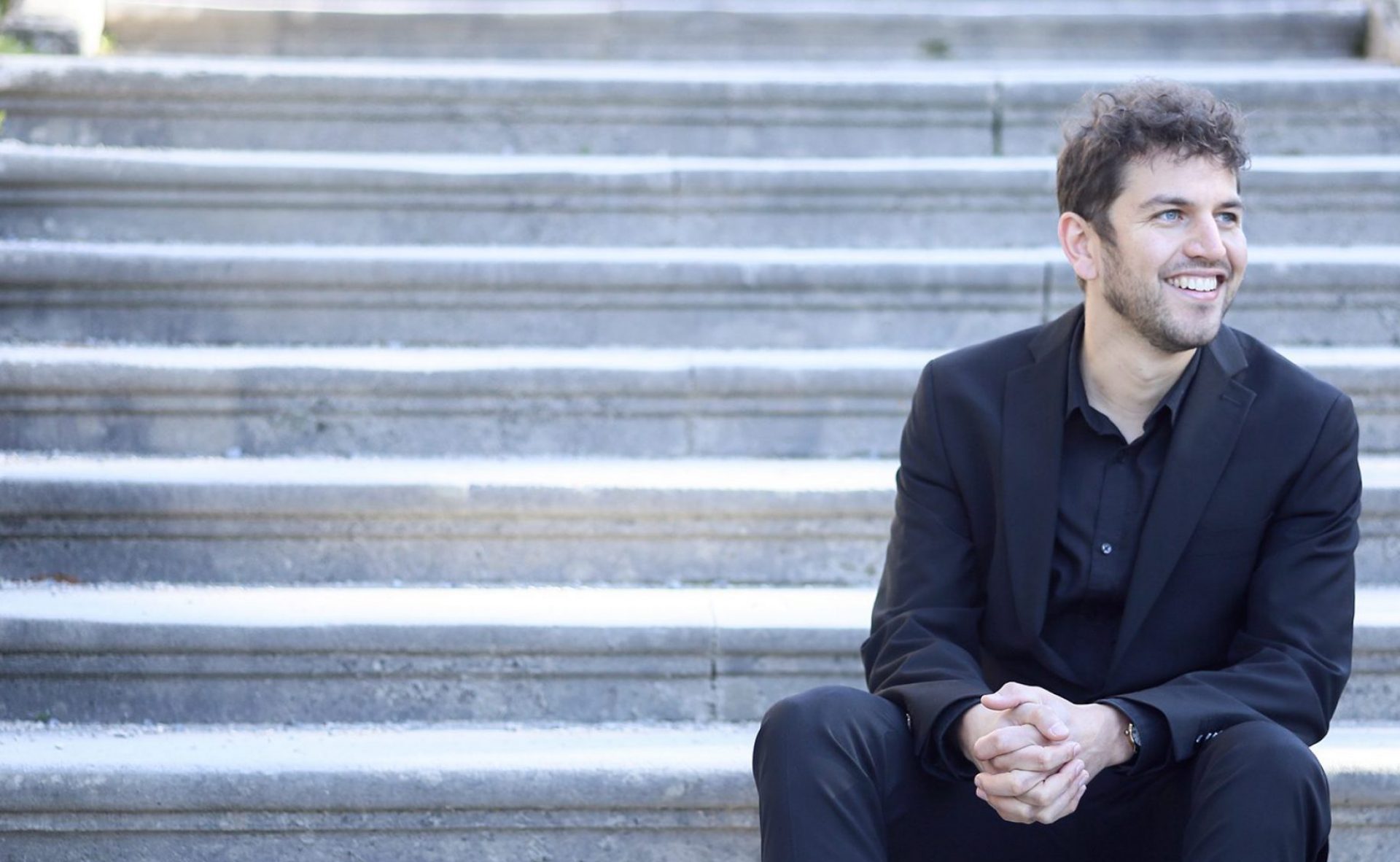Soprano Jana Baumeister has been a permanent member of the ensemble at the Staatstheater Darmstadt since the 2014/15 season and has performed roles such as Pamina, Susanna, Marzelline, Füchslein Schlaukopf and Gretel. In the 19/20 season she was heard there for the first time as Liù, Marzelline and again as Pamina. In 20/21 Jana Baumeister debuted as Pamina in Mozart’s “Magic Flute” at the Salzburg Landestheater.
We often worked together in Darmstadt, where Jana combines her successful career with her life as a mother to her young children. I talked to her about how she manages the work-life balance, which I don’t think is discussed enough in the opera world, and how her career has developed in recent years.
This interview was originally done in German. For the German version, please click here.
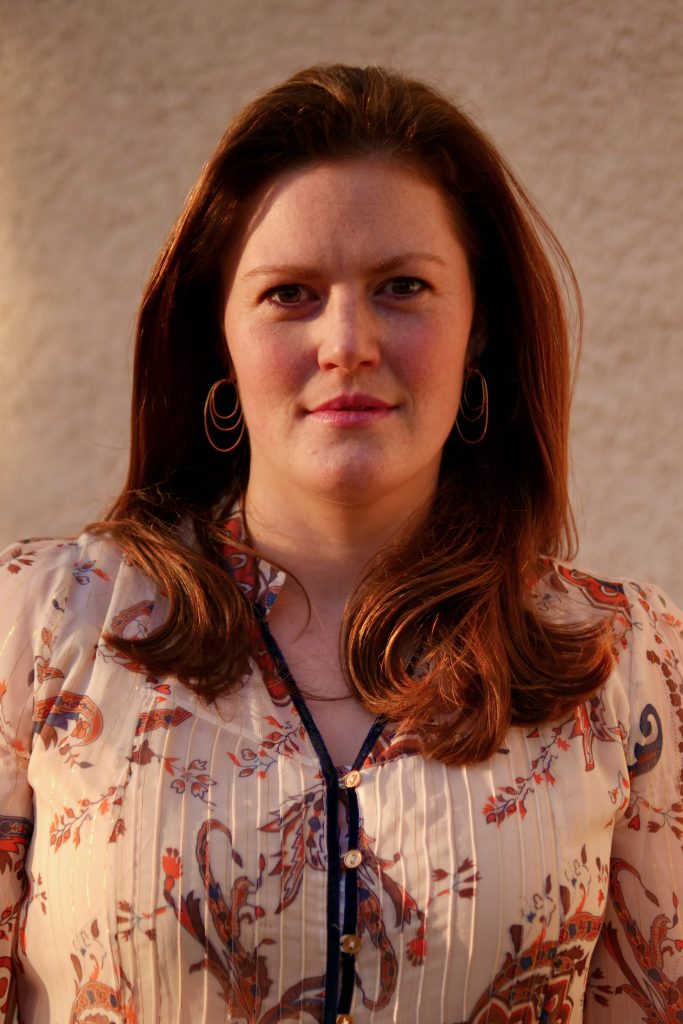
All the components that make up a life can be reflected in the voice, and that’s wonderful.
What song would get you on the dance floor?
Saturday Night Fever
Who is your favourite composer?
For concert or symphonies Mendelssohn, otherwise Mozart.
Do you have a favourite operatic role?
Of the roles I have sung so far: Pamina, Ännchen and Liu! And I’m curious to see what other favourite roles the next few years hold in store for me.
If you weren’t working at the opera, what profession would you be doing?
I would definitely sing! But actually I get to live my dream job and I’m very happy about that!
Describe your Hot Toddy in three words.
It’s clear, pure and sometimes sparkles…. my glass of iced water!
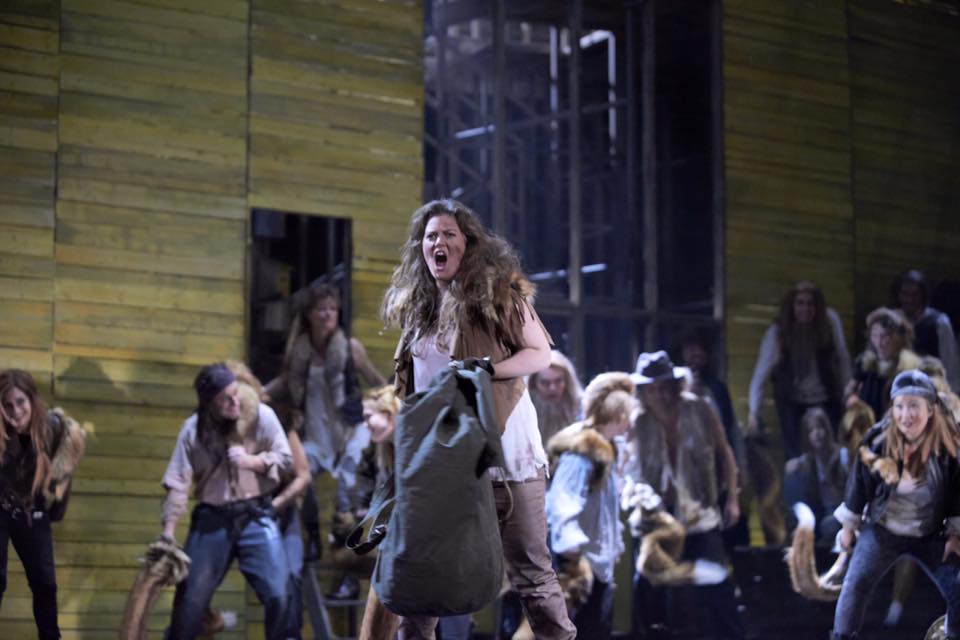
When did you start singing?
In the first grade, in the children’s choir. I was so happy to be able to do that. My choir director always said, ‘you sing too high, Jana!’ That was in my village children’s choir.
In the seventh grade I started singing in the children’s choir of the Mainfrankentheater in Würzburg and when I grew up I joined the Extrachor. I was fascinated by opera from a very early age.
At what point did you decide to study singing and do it professionally?
It just developed that way. I started taking singing lessons when I was 14, and then I started singing in church services and at weddings. Later came the first smaller concerts.
Shortly before graduating from high school, singing had become such a passion that I could no longer imagine any other profession. It must have taken my parents a little longer to get used to my career aspirations. But they always supported me and helped me to realise my goals.
How was the bridge from your studies to the professional level?
I did my diploma in education and arts in Nuremberg and then realised that I really wanted to be on stage. My Master’s degree with Hedwig Fassbender at the University of Music and Performing Arts in Frankfurt was exactly the right preparation for this. My dream was to work in a theatre after my Masters degree, and for that I worked at full throttle for two years.
Karsten Wiegand, the Intendant1 at Darmstadt, heard me at an audition for the Intendants at the university and invited me to audition at the Staatstheater.
It was one of the most beautiful audition experiences I was allowed to have! I remember that I immediately had a feeling of being at home on the stage of the Großes Haus2 and it has remained that way until today. I am very happy and grateful that I am now able to begin my sixth season in this theatre.
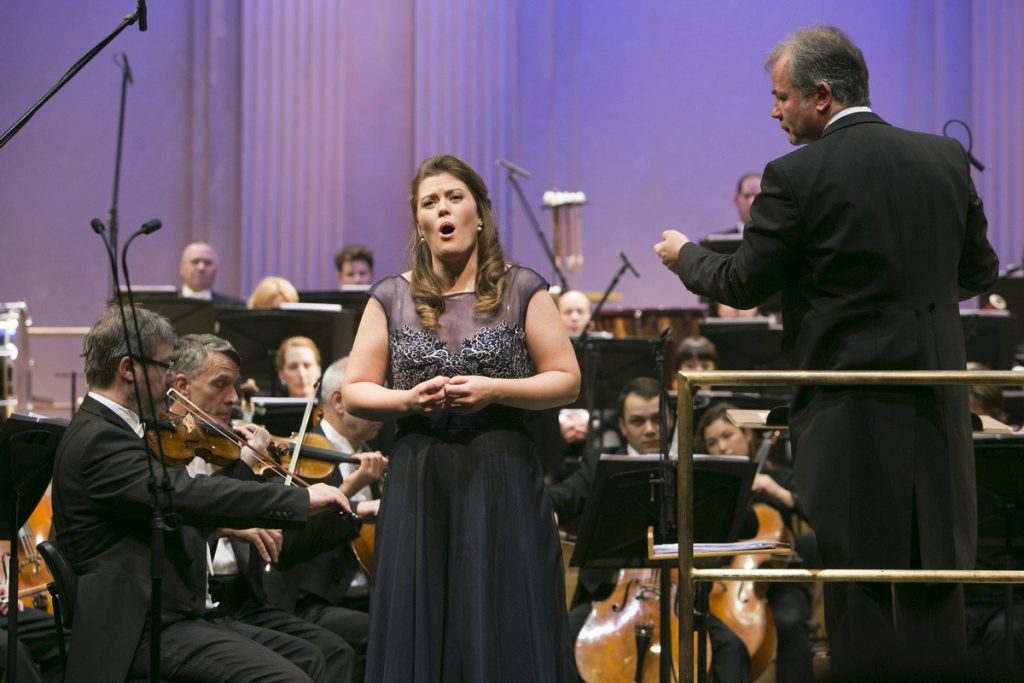
In 2016 you won first prize at the National Singing Competition Berlin. Would you recommend taking part in competitions and how has it helped you?
There are competition types and those who are not. I probably belong to the latter category. But it’s always good to get out of your comfort zone at least once. Preparing for a competition is different and the nice thing is, you can decide all by yourself what pieces you can present yourself with. What do I feel comfortable with? What can I show? And this diversity is the beauty. It’s important to have a suitable competition programme that represents you well, but is also effective on the outside. And it is also exciting to hear the other singers. Sure, it’s a competitive situation, but you can also learn such a lot from the other contestants!
Through the competition I have received many good concert offers, also with big, well-known orchestras, which has been great! And of course a first prize like that is also a nice recognition of my artistic achievement and encourages you in your path.
You talked a bit about your experience with auditions. If you could, would you change the audition process or do you think it’s good the way it is?
We work on improvement strategies throughout, so I guess it’s the same in opera. An audition is not an easy situation, because many different “needs” want to be covered.
It is certainly good to always see an audition as an exercise for oneself, to be able to introduce yourself personally as an artist. Sometimes the decision about the outcome is based on factors that you cannot influence yourself, but nevertheless you can put It down as experience for yourself. A good agent who can specifically arrange auditions for a singer certainly plays an important role.
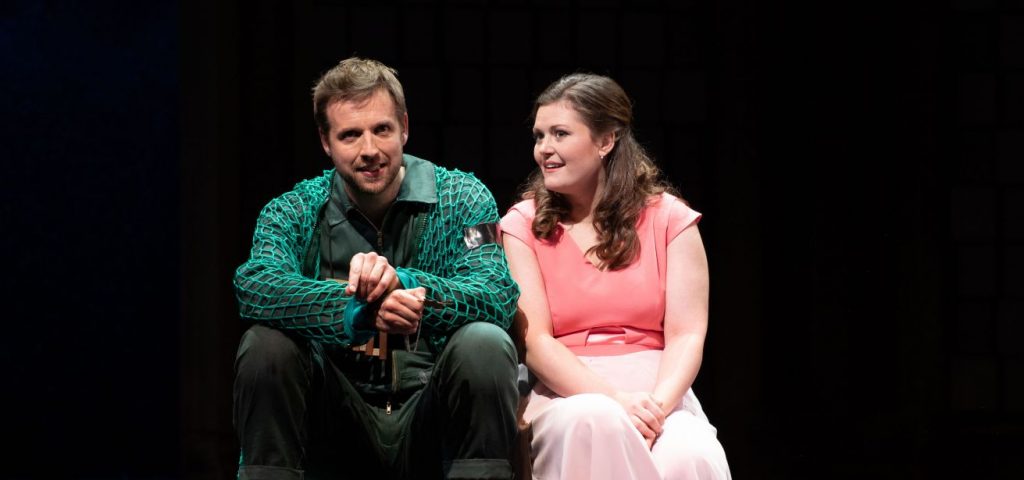
This profession is great in the certain eccentricity it brings. That’s what we want. But it’s also quite good to get a portion of realism at home, because that grounds you and gives you another anchor.
You have a young family. How do you find balancing family and work with your job?
Challenging, but very nice! For me personally, it’s good because I like being in a permanent job. I like having a theatre home, so it’s currently the best way for me to combine my family and my job. I love my job, but I also always wanted to have children, and I knew that. The great thing is that it is exhausting, but you also grow beyond yourself and realise that you can achieve a lot. In addition, it’s also an insane balance. When you are in the playground with your child, you are in the playground with the child. When you play Lego or read a book with your child, that’s what you do and nothing else. That’s great because you can rediscover a lot of the play instinct that is there at work, but that still gets lost a bit in everyday life. Children bring you very much into the here and now, and that’s great. That’s actually the best thing about it!
I can learn a lot from my children. Some things you simply forgot when you “grew up” and now you can look at them anew through the eyes of children and rediscover them. And on the other hand, children are always direct and get straight to the point. What they like and what they don’t like. That’s sometimes hard, but that’s the way it is.
I understand what you mean: in the theatre you sometimes work with directors in a very profound and quite philosophical way, whereas life with children is probably more realistic, isn’t it?
Yes, it’s grounding. This profession is great in the certain eccentricity it brings. That’s what we want. To somehow elevate everything again and go even deeper and there has to be more content and meaning behind it. That’s good and exciting. But it’s also quite good to get a portion of realism at home, because that grounds you and gives you another anchor. Some things are also relative.
What would you change to make the family/work balance easier?
Maybe I would like to adjust the working hours a bit. Evening rehearsal at our theatre is from 6pm-10pm; if I could wish for a time it would be from 5pm-8pm. I’ve experienced that with guest productions and found it nice to be able to spend some time with the family after rehearsal. On the other hand, the nice thing about working hours is that I can see the children in the afternoon and play with them.
Above all, it is important that your partner also wants to support the model, because there are always times when more mum is needed and other times when more dad is required. You can only manage this together, especially in a job like this. You need good support from your partner.
I just had a guest engagement at the Salzburg Landestheater and we went to Salzburg as a whole family for five weeks. That was the first time we had done that. My husband happened to be on parental leave that month and it was very nice because I was working and he had the children. We were all together in Salzburg and had a new city to explore and go to the mountains for five weeks. That was insanely good for the children. It was just the two of them and they played a lot together. Once the kids are in school, we can’t do that anymore. Of course, travelling and experiencing other cities is a benefit that comes with this job, which others don’t have. These are special memories that last.
What advice would you give to other singers who are thinking about starting a family?
If you want to, then do it. The right time will never come. I had to learn the first time to say ‘no’ to a production in my first pregnancy because I gave birth during that period. I couldn’t postpone that. And that was a whole new experience. It wasn’t easy to say ‘I can’t do it’, but there always comes a point where something doesn’t work out for some reason, and I think if you want a family and you feel ‘now is the right time’, then it’s the right time. You’d always regret putting it off for something otherwise. There are a few years where it involves sacrifices, but there is much more to gain.
We’ve already talked a lot about the practical things. Does your family life add another dimension to your artistic life?
Yes, I think so. By having children, you look at the world from a different angle. And it’s fun to try that out. And it’s also fun to read texts much more directly again. What exactly is the message of the text? And that’s how I shape it. I have found even more playfulness in shaping texts. And it’s also the case that music moves me even more than before. It gives me an opportunity to have some me time and it’s my opportunity to express myself even more precisely, because I know that afterwards I’m also a mum again. But when I sing, I am ‘me’. That’s great, because at some point after the first six months with my child I realised, ‘wow, I’m still here too’. I’m a mum now, but I’m still there too, and that feeling is very much in the music. It doesn’t get lost.

I had to learn the first time to say ‘no’ to a production in my first pregnancy because I gave birth during that period. There are a few years where it involves sacrifices, but there is much more to gain.
What is the most important thing for you when performing on stage?
That I have a good connection with myself and the audience. Of course also with my colleagues and the pianist or conductor and the orchestra. It is important to make music together and convey a message together. That is also something that became so clear in the Corona period, why performances have to be live, because such tension is only transmitted live. That feeling in the room when the air is tense, when it crackles, when you know that you still have to wait for the right moment – all that is also transmitted to the audience and to the stage. These invisible tensions make the profession what it is. And the only way to do that is through a live experience.
What do you mean by ‘a connection with myself’?
That I am with myself. That I feel myself, that I feel my breath. I am the instrument and I have to be very grounded and be connected to my breath. If, for example, the excitement is too great or my head takes over too much, then the connection is not quite there. And then again there are those very special evenings where it is really balanced. Where you are completely overwhelmed by the intimacy with which you can make music, and that is what you are always looking for. But that only works really well with an audience, you can’t get that in a rehearsal. You can simply feel how people react to a story, how you can listen to it – both with each other on stage, but also with the audience.
How do you want to develop yourself, your voice and your career in the future?
We,, I’ve now turned 33 – and now comes the first small ‘change of Fach’. I’ve always sung the light lyric part and with Liu (Turandot) the change actually came. I noticed after having my first child that the voice found more space in my body. A lot had happened in my body, so you can give it space and room. The voice accepts that and then with Liu it was a real door opener where I thought, ‘wow, okay.’ And then came the second pregnancy, and that’s now consolidated to where I feel comfortable – that’s why I can now sing a Donna Anna (Don Giovanni). I couldn’t have done that three years ago. It’s just matured so much and that’s great, because now comes Donna Anna, maybe soon Agathe (Freischütz) or the Countess (Le nozze di Figaro), etc. Micaëla (Carmen) would still be great to try out, and then at some point little Wagner things would be great too, if they were available, just for a try. But one thing at a time!
How was that feeling of finding more space in your body? For me, my hands will hopefully always be more or less the same, but it must be crazy to rediscover your instrument like that?!
It was quite strange. At the time I was singing Pamina and noticed that it was somehow easier than before. And I asked myself: where is my voice, it feels so different! Then I spoke to my teacher and she said: ‘yes, you have more space now’. And then we just worked with the body and all of a sudden I noticed again ‘ah – okay, it has to sit here’. But that’s great, because the special thing about the voice as an instrument is that it’s alive and changes like your body over the years. So it’s a curse and a blessing at the same time. Because you always have the task of protecting it and making sure that the voice is doing well. And it also grows with you, which is great because it also travels with your personality. All the components that make up a life can be reflected in the voice, and that’s great.
I think it’s important to always set your own standards, because in the end, the reactions you get actually correspond to how you see yourself.
You are a soprano and that can be difficult. How did you deal with the competition?
I always tried more to see the positive side of it. Someone is always particularly good at something, and you can always learn something from that. That’s how I’ve tried to see it. And the next thing is also: we are all different. There are many sopranos, but they are all different and I think the most important thing is to stay true to yourself, because if you stay true to yourself and if you can emphasise your individuality, then it is convincing. Hedwig Fassbender used to say, ‘yes, there are many, but there’s only one you’, and at the end of the day it’s often a matter of taste as to what, how, or who is sought after. But quality will prevail. That’s the way it is. And maybe it won’t work out one time, but it will work out the other time. You also have to stay positive.
It balances out quite well. Sometimes you forget that in a moment when something doesn’t work out. And when you’re really sad and disappointed, it helps to check your CV again and realise ‘you’ve already done something’, so you don’t lose yourself too much. It’s the same with the competition: it’s there, but you can also draw something positive from it and maybe learn something. With age comes more composure.
I remember when I started in Darmstadt, I was excited at every rehearsal. Everything is new, exciting. You also have a lot of questions, like: How does your voice cope when you have eight hours of rehearsal every day, how do you mark properly, how do you divide your energy? These are all things you learn over time, and you can only learn by doing. In the end, you can’t imagine anything else, and the premise I set myself is that I’m always fine with what I do, in other words, that I really give my best. I am generally a very critical person, also with myself, maybe sometimes a bit too critical, but I need that so that I can say that I always want to progress. I want to be able to say after every production: I worked on the role, I learned something new and I grew from it. That’s the premise and how it’s judged at the end, I’m not in that. But I think it’s important to always set your own standards, because in the end, the reactions you get actually correspond to how you see yourself.
What do you need from a stage director as a singer?
Trust. Trust is very important, and then a good dialogue. Trust in the fact that the singer is also willing to join in. The singer also needs time, there are many things to consider, because somehow you also have to sing. The whole thing is called music theatre and the music simply comes first. In other words: it takes up the most space and I think you need to trust that you can still develop in the rehearsal process and that an exchange of ideas is incredibly important. The director can look from the outside and can then give good feedback. If that works, the singer can fill the role and convey it credibly.
And from a conductor?
I think the most important thing is that a conductor wants to breathe with a singer. That is the most beautiful thing. When you notice that the conductor sings along with you, so to speak, or breathes along with you, then you can really sing freely. That is the greatest gift, because then you make music together and don’t have to talk much. When you get into a flow of breath…. Wow!
In the rehearsal process, I hope to have respectful cooperation from the conductor, so that both sides can be heard. And that they respond to the singer as an individual in a certain way, because every voice brings something different. It’s not a question how fast or slow to be in tempo, but it’s sometimes a request that makes the singer shine even more than, for example, the other double cast, for whom a different tempo is better. You can achieve the same effect but it is much more satisfying for everyone because you are doing something together. And in fact, what I also want from a conductor is to be challenged. That they work properly musically, follow a clear vision to the premiere and don’t stop being in constant dialogue with the singer. I see that as a great privilege of an opera production compared to a concert. You have six weeks to really grow together and in the end you have a great production where everyone knows how to pull everything together.
I believe that the cultural form itself will remain, because music can simply trigger different emotions than anything else.
What does the future of opera look like? Does it have to change or do you think it will stay as it is?
Corona has taught us a lot, but I don’t think opera will disappear. It will certainly always change, just as there have been times when music alone has dominated operas. Now we are in the age of musical theatre, which I appreciate very much because there the story has become even more pervasive and important, which I like very much. I also think it’s great when you get a good idea as a character and you go through a development in the evening, which only Regietheater has brought. There is certainly something possible that will change there again and that perhaps there will be more contemporary music that remains singable. But I believe that the cultural form itself will remain, because music can simply trigger different emotions than anything else. That is a special feature of music and that is why it will always endure, because it always hits emotions without words. That’s the main strength of it.
Notes
- The Intendant of a German theatre is the boss of the whole theatre, who is ultimately responsible for who gets hired.
- The ‘Großes Haus’ (big house) is the larger performance space in a German theatre, which may have a variety of different sized performance spaces.
You can learn more about Jana, including her upcoming performances, at her website here.
